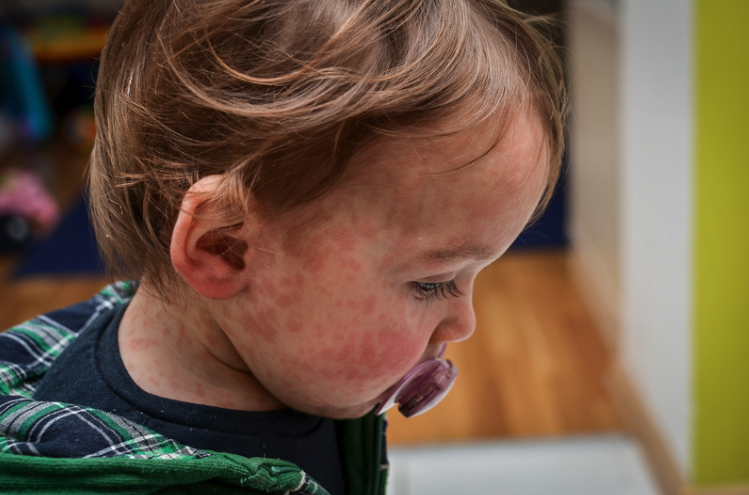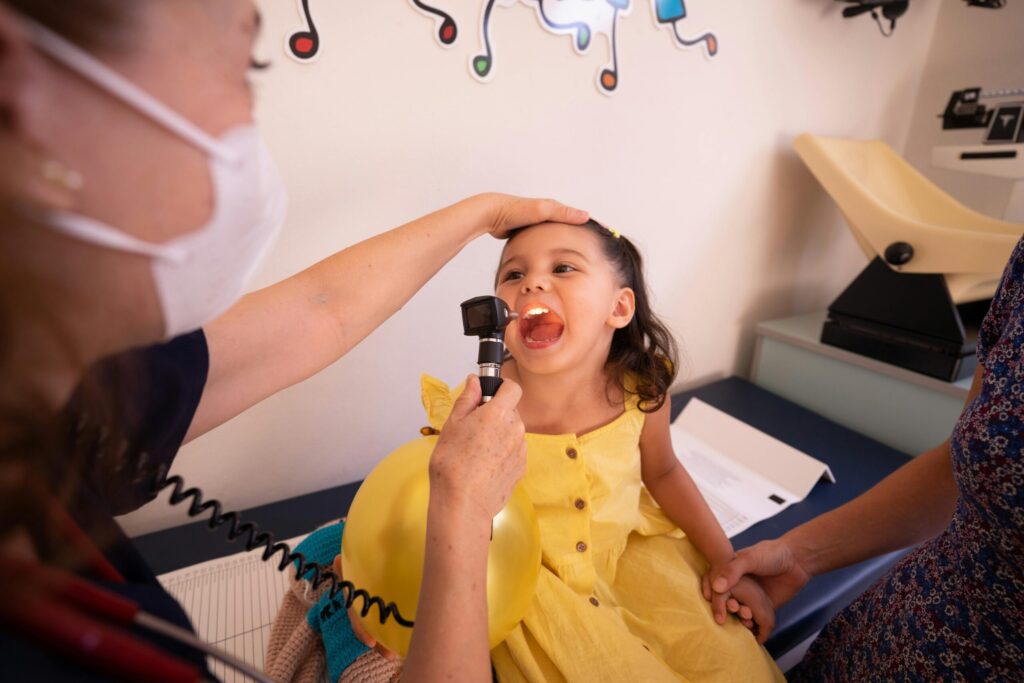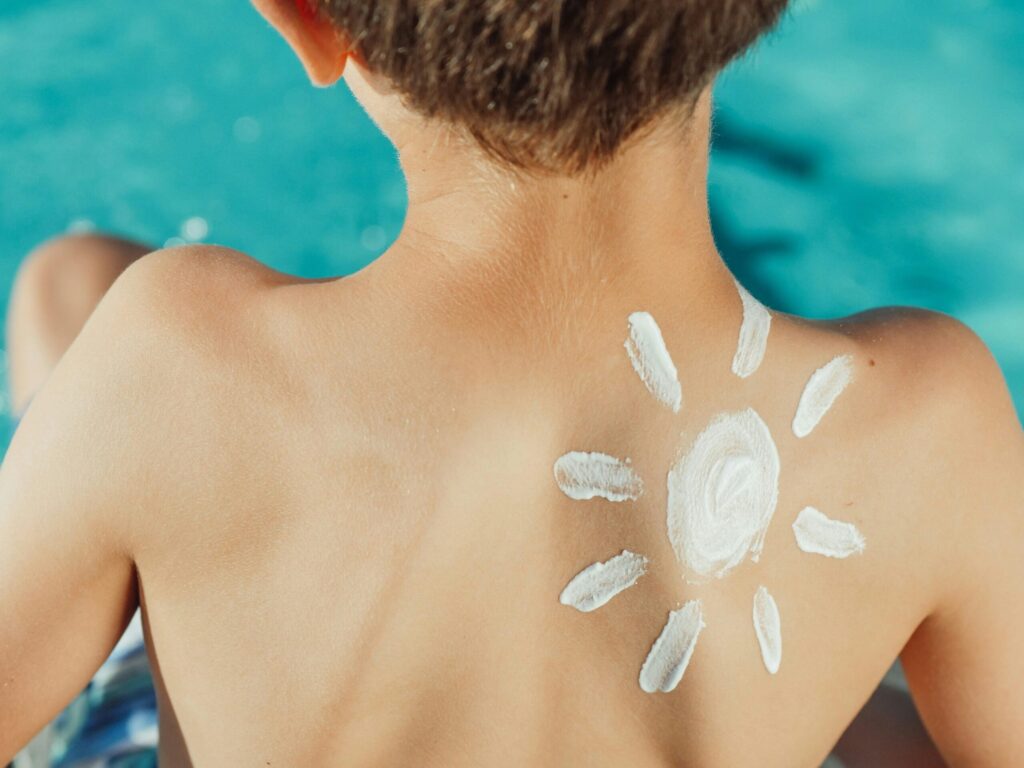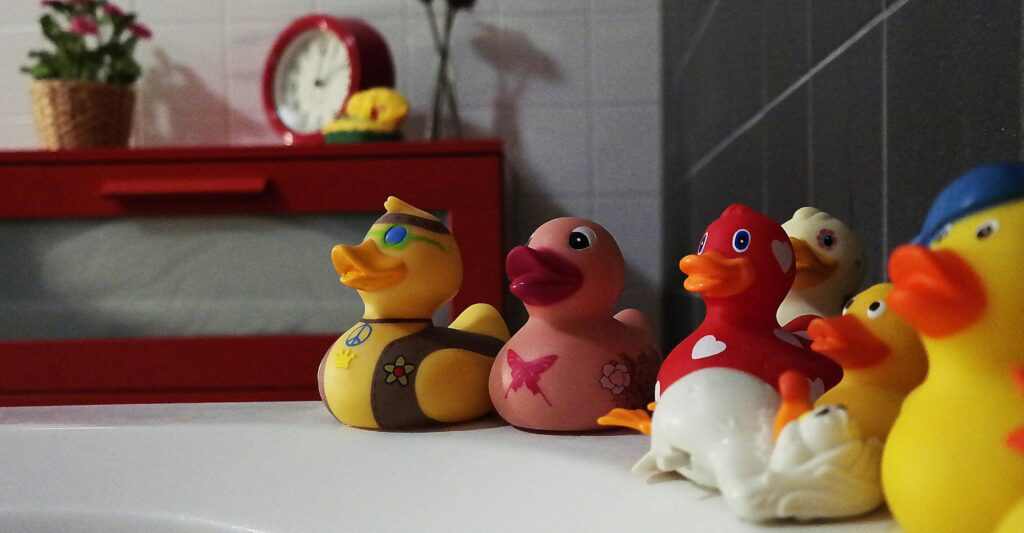As of March 13, 301 Measles cases have been reported this year in the United States across 15 jurisdictions. Though the majority of cases have been in the state of Texas, a new case of Measles in an unvaccinated child under age 5 was reported on March 11 in nearby Suffolk County on Long Island. This has prompted many questions and concerns from parents and caregivers across our communities – we’re here to break it down for you and help you proceed confidently as an well-informed decision-maker.
What is measles?
Measles, also called Rubeola, is an airborne, extremely infectious, and potentially severe illness most commonly recognized by its signature red blotchy rash. The virus lives in the nose and throat of an infected person and is spread through the microscopic droplets, so if an infected person coughs, sneezes, or even breathes close to someone else, the infection can be easily spread. Infectious droplets can remain airborne and on some surfaces for up to 2 hours even after the infected person has left the area. Although the virus can affect anyone, it is most commonly seen in children.
Because of its high infectiousness, Measles spreads rapidly during times of high travel, like school breaks. People who contract the Measles virus usually begin to develop respiratory symptoms, like cough and runny nose, as well as a fever and watery eyes 8-12 days after being exposed. The hallmark symptom of Measles – a red blotchy rash across the body – tends to appear 3-5 days after the initial symptoms appear.
While Measles can be a minor illness for many, others will develop serious complications which can lead to death, and it can be difficult, even impossible, to determine who will be affected with serious complications. This is why vaccination is the #1 recommended action to take for Measles prevention.
A Brief History Of The Measles Virus & Vaccine
The first known documentation of Measles came from a Persian physician in the 9th century. By 1912, healthcare providers and labs in the United States were required to report all cases to the health department. In the first 10 years of this reporting, approximately 3-4 million Measles cases were reported annually, with about 48,000 people hospitalized. About 400-500 people died from complications of the virus each year, including children who were previously considered to be healthy.
In 1954, physicians began efforts to seek a cure for Measles and by 1963, a vaccine for Measles was developed and licensed for use in the United States. In an effort to provide convenience and thereby increase vaccination rates, the Measles vaccine was then developed into a combined single vaccine to target 3 diseases – Measles, Mumps, and Rubella. This is what we now know as the “MMR” vaccine. A Measles outbreak among vaccinated children in 1989 prompted a recommendation of a second dose of the MMR vaccine for all children, which further reduced the number of Measles infections. By the year 2000, Measles was declared eliminated in the United States due to high vaccination participation.
Why Do We Have Measles Outbreaks Now?
Despite the good news of Measles elimination in 2000, the virus has been making a comeback in recent years due to global travel (it has not been eliminated worldwide) and reduced immunization participation. One of the most severe contributing factors to reduced vaccination can be attributed to a paper published in 1998 from a British gastroenterologist, Andrew Wakefield, which suggested that children who were diagnosed with autism developed their symptoms within a month of receiving their MMR vaccine. Wakefield theorized that autism could be caused by a breakdown of the intestinal lining from the vaccine, allowing encephalopathic proteins to be absorbed. This study induced widespread panic among parents who began to feel hesitant about the safety of providing the MMR vaccine to their children.
Scientifically, this study was flawed and data did not support any true association between the MMR vaccine and an autism diagnosis. Subsequently, several epidemiologic studies were conducted in an effort to address parental fears raised by the Wakefield study. These studies, paired with the observations of large-scale vaccination programs, disproved the claims of the 1998 study. However, the fears among parents were still difficult to quell, especially as other anecdotal theories emerged suggesting the combination of vaccines or the preservative (thimerosal) used in the vaccine may cause autism.1
Twenty studies have since disproven those claims, but disinformation campaigns, especially across the internet and social media, continue to instill fear among parents and those who have yet to be vaccinated. The resulting lower vaccination rates create more opportunity for outbreaks of preventable diseases like Measles.2
The good news is that people who have received 2 doses of the MMR vaccine are unlikely to contract Measles. However, Measles vaccines are not typically recommended until 12 months of age, leaving infants especially vulnerable to contracting the disease and putting them at risk for complications.
Who Is At Risk For Contracting Measles?
For persons who are not vaccinated and have never been exposed to the virus, the likelihood of contracting measles is 90% in close-contact settings. Close contact is considered being in the same enclosed space as someone infected with Measles. It is also possible that an unvaccinated person can contract Measles after being in a room within 2 hours of an infected person. If you are unvaccinated and had any exposure to someone with Measles, it is a health risk.
For parents with babies who are too young to receive the Measles, Mumps, and Rubella (MMR) vaccine, precautions can and should be taken during times of outbreak:
- Avoid exposure to Measles by limiting contact with crowded places and public transport
- Stay away from sick individuals, especially those who have symptoms of Measles like fever, rash, cough, and/or red eyes.
- Be vigilant about visitors – ask anyone with recent travel history or symptoms of illness to postpone visits with your baby.
- Ensure that everyone in your household, including caregivers and frequent visitors, is fully immunized against Measles with 2 vaccine doses.
- If exposed, speak with your baby’s primary care physician right away. Immune globulin (IG) may be an option for babies as a temporary protection measure. This is most effective if given within 6 days of Measles exposure without vaccine protection.
- Avoid travel to areas of outbreak. If you cannot avoid travel, speak with your primary care doctor or local health department to determine if an early MMR vaccine is appropriate.
- If breastfeeding, consider continuing this to provide some passive immunity to your baby.
- Ensure good hygiene practices such as handwashing with soap and water, disinfect frequently touched surfaces, and cough or sneeze into your elbow.
Symptoms And Complications Of Measles
Common initial symptoms of Measles appear 7-14 days after exposure, including:
- Fever
- Cough
- Red, watery eyes
- Runny nose
- Tiny white spots inside the mouth
These telltale symptoms of Measles are likely to appear 3-5 days after initial symptoms:
- Flat, red, spotty rash on face, spreading to neck, trunk, arms, legs, feet. Click here to see an image of Measles rash.
- After rash appears, the fever may spike to >104° F
1 in 5 unvaccinated people in the US who get measles is hospitalized. Complications from Measles infection include:
- Pneumonia (fluid in lungs)
- Encephalitis (brain swelling)
- Premature birth or low birth weight
- Rarely, death
Will Vitamin A Or Cod Liver Oil Help Lower My Risk?
There are some claims circulating among communities that vitamin A or cod liver oil (which contains higher levels of vitamin A) will help to prevent and treat Measles. This claim has some misinformation that can put people at risk for dangerous health outcomes.
During a Measles infection, the virus greatly depletes vitamin A in the body, which can cause complications like blindness. The World Health Organization (WHO) recommends that people already infected with Measles receive 2 doses of vitamin A from their physician to boost those levels in the body. However, too much vitamin A can be harmful! Large doses of vitamin A should only be recommended and administered by a licensed healthcare professional such as a physician. Self-administration of large doses can cause negative side effects such as vomiting, liver damage, or blurry vision. Vitamin A doses are provided to people infected with Measles, but vitamin A cannot prevent nor cure Measles.
So while it should generally be OK to take a vitamin A or cod liver oil supplement as part of your regular routine, too much can be harmful and it should not replace other proven Measles prevention methods.
If I Had My Vaccine, Am I Safe?
The great news is that 1 dose of the MMR vaccine provides 90-93% protection against contracting Measles, and 2 doses of the MMR vaccine increases the protection rate up to 97+%. Fully vaccinated people are unlikely to need any additional vaccinations against Measles.
People born before 1957 likely already had natural exposure to the virus. If you were born after 1963, it is likely that you received a vaccine, but you should check your health records and speak with your primary care physician or local health department if you’re unsure. Families following the CDC & AAP-recommended vaccine schedule most likely received their first MMR vaccine between 12-15 months old and their second between 4-6 years old (or within 3 months of their first dose)3. One exception to this is children who travelled internationally or were in an area of outbreak may have received their first dose as early as 6 months old.
If you were exposed to Measles and have not been vaccinated, it is generally recommended to receive a Measles vaccine within 72 hours of exposure. However, it is imperative to first contact your primary care provider and/or local health department for guidance to protect yourself and others.
Vaccination is the most important way to avoid contracting Measles. If you are a Concierge Pediatrics member and have any questions about your child’s Measles risk or vaccination status, give us a call for guidance. We’re here to help you make the best decision for your family’s well-being.
What Else Can I Do to Protect Against Measles?
Stay vigilant! If you are unvaccinated or immunocompromised and were exposed to Measles or think you may have been exposed, isolate yourself and limit contact with other people, and call your healthcare provider. People who have received 2 doses of the MMR vaccine and are healthy should call their healthcare provider, but are unlikely to need to take additional action.
Find a trusted, evidence-based source of scientific information. At Concierge Pediatrics, our board-certified pediatricians and pediatric teams are here to help you navigate all of your concerns and questions. Other great resources for evidence-based information include the Centers for Disease Control (CDC), the National Institutes of Health (NIH), the World Health Organization (WHO), and your local health department.
The team at Concierge Pediatrics understands that navigating health concerns like outbreaks of Measles can be worrisome. We are here to provide clear, evidence-based guidance so you can be prepared to make confident decisions. Whether you have questions about your child’s risk, vaccination status, or how to best protect your family, we’re just a phone call away. Your child’s health and safety are our top priorities, and we’re committed to being your trusted partner in expert pediatric care, trustworthy information, and compassionate support.










